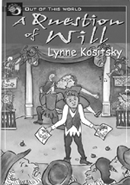
A Question Of Will
Lynne Kositsky
Roussan Publishers
$7.95
135pp
1-896184-66-9
Enter an average teenage kid on a school trip to London to learn about “the greatest playwright that ever lived.” Left behind by the group and lost on the way to the Globe Theatre, Perin Willoughby (soon to be known as Willow) is drawn towards the foggy Thames near London Bridge and whisked back in time. She recovers in the arms of newfound friend John Pyke, an actor with the Lord Chamberlain’s Men. He soon becomes a love interest.
The story that follows – from Willow’s 1595 fall into the arms of her beloved “Pykester” to the end – is gripping. In much the same way as Willow, we are thrown into London theatre life, with all its spit and swashbuckling adventure. As Willow establishes herself in her new grottier surroundings, Kositsky really picks up the pace. (As with Rebecca’s Flame, the author’s second novel, I couldn’t put the book down.) The resolution to this comedy of errors, of gender concealed, disguised and discovered, of love, can only happen if and when de Vere proclaims himself the playwright of Shakespeare’s works, or if Willow returns to the twentieth century.
Willow becomes a key player in shady dealings between her roomie Will Shakespeare (who sleeps in his birthday suit) and de Vere. She also becomes a leading actor in the Lord Chamberlain’s Men, gaining popularity with Queen Elizabeth. As a young entrepreneur, she introduces fried spuds (chips in a twist) and sandwiches to the spectators in the pit, and launches history’s first awards show – the Bessies – complete with sealed scrolls and miniature statuettes of the Queen for her majesty’s entertainment. Kositsky even throws in a classic love triangle: Willow likes Pyke likes de Vere’s daughter likes Willow. What novel twists to lighten the gloom and gore, the dust and dirt of London’s theatre scene in the sixteenth century!
The language is rich and playful, a mix of Willow’s feisty teenage expressions and Kositsky’s tinkered-with version of Tudor English. The result is a novel that speaks in many tongues, brought alive by the author’s lively alliterations and singular similes – the evil Gabe Spencer’s eyes as “runny as raw egg whites,” “baggage as heavy as a month of Sundays,” and Queen Elizabeth’s teeth like “blackened gravestones in the boneyard of her mouth.”
Imaginative and entertaining, A Question of Will could create a whole generation of teenage Shakespeare fans – or should I say Edward de Vere fans?
mRb





0 Comments